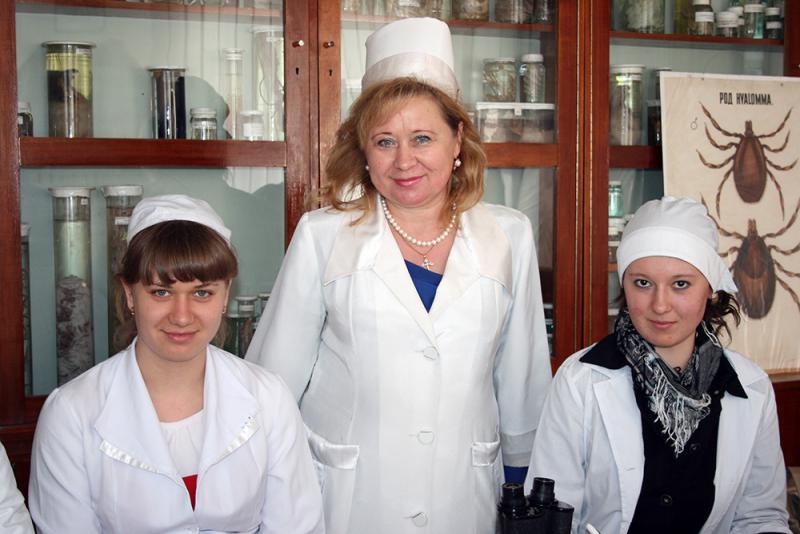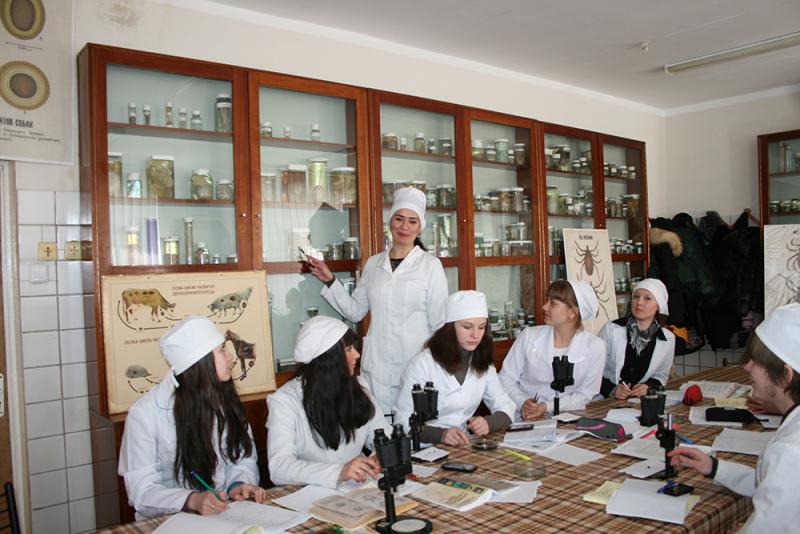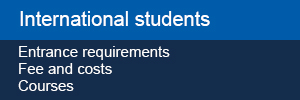Academic Work
Educational process at the Department is based on holding lectures, laboratory and practical classes, performance of course and diploma works by students, holding conferences, round tables, seminars, meetings with leading specialists-practitioners. In recent years training of specialists under master's programs as well as retraining and advanced training of veterinary medicine specialists became the priority tasks of scientific and pedagogical workers. The Department operates postgraduate and doctoral programs in the specialty 16.00.03 – “Veterinary microbiology, epizootology, infectious diseases and immunology”.
Classes in classrooms, research laboratories and directly at enterprises are conducted by highly qualified specialists, docents and professors. The research laboratory is used for conducting laboratory-practical classes. Practical training of future specialists is carried out in production conditions during field trips to the university's educational and research economies.
Scientific student circles function at the Department: "Epizootology and infectious diseases", "Organization of veterinary affairs" where all willing students have the opportunity to deepen their knowledge and conduct scientific and research work. Results of the latter they can further arrange in the form of course and diploma theses and also continue studying the problematic issue in graduate school.
Fruitful pedagogical work and scientific achievements of the Department's employees in recent years are displayed in textbooks, monographs, manuals, scientific and methodical recommendations and author's certificates and patents.
2022-2023 academic year
Name of the discipline | |||
Mandatory disciplines | |||
Epizootology and infectious diseases | |||
Veterinary virology | |||
Epizootology and infectious diseases (English-language) | |||
Veterinary virology (English-language) | |||
Veterinary microbiology | |||
Veterinary microbiology (English-language) | |||
Organization of veterinary affairs and national and international veterinary legislation | |||
Organization and economy of veterinary affairs | |||
Special epizootology | |||
Special epizootology (English-language) | |||
Veterinary preventive technologies of contagious cattle diseases | |||
Veterinary preventive technologies of contagious diseases of sheep and goats | |||
Veterinary preventive technologies of contagious poultry diseases | |||
Selective disciplines | |||
Biosafety and biosecurity (optional) | |||
Biotechnology in veterinary medicine (optional) | |||
Methods of mycological research (optional) | |||
Zoonoses and the concept of one health (optional) | |||
Laboratory diagnosis of infectious diseases (optional) | |||
Veterinary support of beekeeping (optional) | |||
Veterinary support of poultry farming (optional) | |||
Infectious diseases of fish and hydrobionts (optional) | |||
Microbiology of meat (optional) | |||
Microbiology of fish (optional) | |||
Management and marketing in veterinary medicine (optional) | |||
Organization of veterinary business (optional) | |||
Sanitary microbiology (optional) | |||
Sanitary virology (optional) | |||
Technical microbiology (optional) | |||
Veterinary preventive technologies of contagious diseases of exotic and fur animals (optional) | |||
Veterinary preventive technologies of contagious diseases of horses (optional) | |||
Diseases of aquarium fish (optional) | |||
Laboratory diagnosis of contagious diseases (optional) | |||
Veterinary preventive technologies of contagious diseases of dogs and cats (optional) | |||
Veterinary preventive technologies of infectious diseases of pigs (optional) | |||
Specialty - 211 "Veterinary Medicine" (term of study - 1 year 4 months) | |||
Preventive technologies for ensuring the health of horses | |||
Preventive technologies for ensuring the health of small domestic and exotic animals | |||
Preventive technologies for ensuring the health of productive animals | |||
Special epizootology (1.5 years, Master’s degree) | |||
Specialty - 212 "Veterinary hygiene, sanitation and expertise" | |||
Veterinary and sanitary virology (212 specialty) | |||
Veterinary and sanitary microbiology (212 specialty) | |||
Epizootology and infectious diseases (212 specialty) | |||
Specialty - 229 "Public Health" | |||
Epidemiology: infectious diseases (229 specialty) | |||
Microbiology, virology and immunology (229 specialty) | |||
Specialty - 181 "Food technologies" | |||
Microbiology of meat (181) | |||
Technical microbiology (181) | |||
Microbiology of fish and seafood (181) | |||
Educational work
Educational process at the department is based on conducting lectures, labs and practical classes, students' coursework and master's degree work, conferences, round tables, seminars, meetings with leading practitioners. In recent years, the priority tasks of scientific and pedagogical staff provides the training of specialists for master's programs, as well as retraining and advanced training of specialists in veterinary medicine.
Classes in classrooms, research laboratories and directly at farms are carried out by highly skilled specialists, associated professors and professors. Practical training of future specialists is carried out under production conditions during field studies at the university's educational and research facilities.
The scientific student society is functioning systematically, because a scientific student circle functioning at the department: "Parasitology and Tropical veterinary science". By October 2017 two separate circles ("Parasitology" and "Tropical veterinary and diseases of exotic and wild animals") functioned at the department, which today, according to the instruction on optimization of students' scientific circles, are united into one circle in which all interested students have the opportunity to deepen their knowledge and carry out research work.
The results of this work will be further developed in the form of coursework and master's theses, as well as further study of the problem issue in the postgraduate study. Members of the Scientific Student Society conduct research on the scientific topics of the department, as well as on individual topics in Ukraine, Asia, Africa and Latin America. The results of their research students annually report on scientific conferences and seminars, publish in journals and collections of scientific works, as well as execute master's theses, which successfully protect the State Attestation Commission.

Professor Natalia Soroka with Master's students (The photo from the department archive)

Associate Professor Helen Semenko at training classes (The photo from the department archive)

Associate Professor Iryna Pashkevych with students at laboratory classes (The photo from the department archive)
For the students of degree "Bachelor" taught courses: "Medicinal Plants", "Veterinary Pharmacology", "Veterinary Toxicology".
For the students of degree "Master" taught courses: "Pharmacognosy", "Pharmaceutical Chemistry", "Toxicological Chemistry", "pharmacy", "Pharmaceutical Technology", "Clinical Pharmacology", "Clinical Pharmacy", "Pre-clinical and clinical studies of veterinary medicinal products".
The study of these subjects performed during lectures, laboratory work and individual work. At the disciplines of "Veterinary Toxicology", "Pharmacy" and "Pharmaceutical technology" students perform coursework.
The practical training of students is performed on the laboratory lessons, educational and manufacturing practice.
The educational practice at the discipline of "Medicinal Plants" implies the study of wild flora and cultivated medicinal plants. The base of practical training is Golosiivskyi forest, phyto center NULES and laboratory of the department.
The educational practice at the discipline of "Veterinary Pharmacology" involves the study of the making technology of galenicals, soft and liquid dosage forms, preparing of herbarium medicinal plants, familiarity with manufacturing activities of pharmaceutical companies.
The manufacturing (master) practice is performed according a program that carry out tasks on each discipline of the master program of "Veterinary Pharmacy". Location of manufacturing practices is pharmaceutical companies, pharmaceutical storehouse, veterinary pharmacies etc.
At the department performed continuing education of heads and chemists toxicologists of the chemical-toxicological departments of veterinary medicine laboratories and training of heads and worker of the pharmacy veterinary medicine according to educational and thematic programs.





